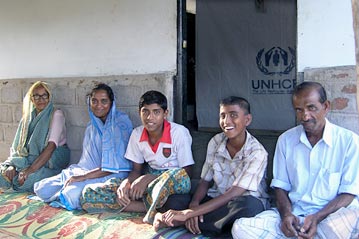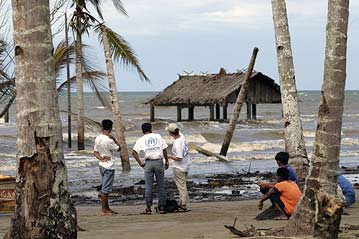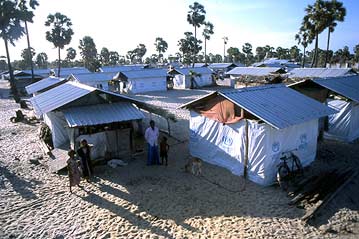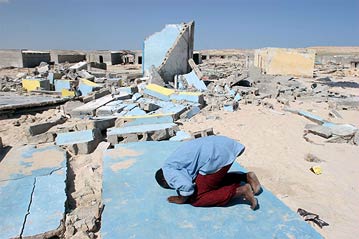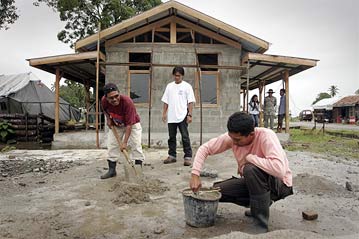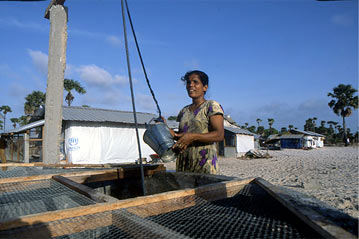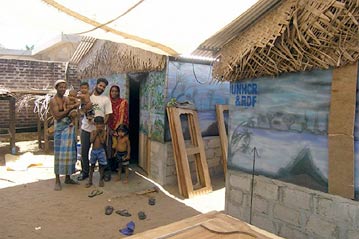UNHCR and partners to begin work in tsunami-hit Meulaboh
UNHCR and partners to begin work in tsunami-hit Meulaboh
9 January 2005
BANDA ACEH, Indonesia - UNHCR and other UN agencies today prepared to begin joint relief work for earthquake and tsunami victims in a previously inaccessible area on the west coast of Indonesia's Aceh province.
Two members of UNHCR's emergency team and a representative of the Office of the Coordinator for Humanitarian Affairs flew by helicopter today from the provincial capital of Banda Aceh, centre for relief operations in the heart of the disaster zone, to set up a common office in Meulaboh.
The office will receive aid supplies from various sources, including UNHCR material airlifted to Jakarta from the agency's main warehouses in Copenhagen and Dubai. Other agencies involved in the initiative include WFP, Unicef, the UN Joint Logistics Centre and UNSECOORD.
UNHCR's first emergency shipment, consisting of tents, sleeping mats, blankets, jerry cans and plastic sheeting, is expected in Meulaboh in 48 hours. A chartered aircraft will ferry 20 tonnes of these materials to Banda Aceh, from where they will be loaded onto helicopters for the two-hour flight to Meulaboh, 200 km to the south-west.
"The reason for the package is that we want to have an integrated response immediately, not bits and pieces coming in here and there," said Alan Vernon, head of UNHCR's emergency team in Banda Aceh.
Also today, UNHCR began loading trucks which will transport to Banda Aceh most of more than the 400 tonnes of emergency relief supplies airlifted to Jakarta last week.
As part of a collaborative plan, UNHCR will operate on Aceh's west coast, focusing on providing emergency and long-term shelter in addition to essential items such as blankets, cooking kits and logistics and transport. It will provide help for up to 175,000 people in the most severely hit area of the Indonesian province, devastated by the Dec. 26 earthquake and tsunami.
Vernon said half of Meulaboh's pre-tsunami population of 60,000 has been uprooted. A helicopter-borne assessment mission last week began a survey of the area. But many areas in the west coast remain to be surveyed. Underscoring the difficulty of land travel, UNHCR's regional representative, Robert Ashe, on Thursday had to turn back to Banda Aceh after driving just 10 kilometres before reaching a large bridge that had been destroyed.
"We passed scenes of total devastation which beggar belief; whole communities wiped out with not a stone left standing of their houses, piles and piles of rubble and wood under which there must still be bodies," he said. Ashe added that his description was "only an impression of what it is like, but the reality is far worse."
UNHCR has started from scratch in Aceh, first sending two staff members on Jan. 1 from its Jakarta office to Banda Aceh to begin operations. They have now been joined by 16 other staff deployed by Geneva headquarters in an unprecedented UNHCR response to a natural disaster. UNHCR's specific mandate is to assist refugees fleeing persecution and violence, not natural disaster response.
In Sri Lanka, where UNHCR has been helping displaced people and returning refugees for nearly two decades, relief supplies were distributed within hours of the tsunami strike. More than 20,000 families, approximately 100,000 people, received plastic sheeting, cooking sets, rope and clothing from one of the few existing stockpiles in Sri Lanka.
On Thursday, UNHCR announced a six-month, $75 million appeal to provide shelter, non-food aid and logistical support for hundreds of thousands of victims of the Indian Ocean tsunami disaster in Indonesia, Sri Lanka and Somalia. The UNHCR operation is part of an overall UN "flash appeal" for $977 million.


